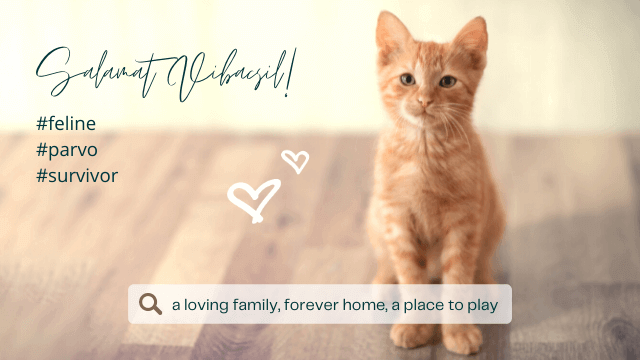
Blue Man: The Truth in the Media
March 25, 2021
Why Would You Want to Fight the Flu With Colloidal Silver/Nanosilver?
February 17, 2022
Enteritis in Cats (Panleukopenia Virus, Parvovirus)
Infection with feline parvovirus (FPV), commonly known as feline panleukopenia virus, causes feline infectious enteritis (FIE).
It's also known as panleukopenia virus since one of the symptoms of infection is a decrease in white blood cell count (which is what panleukopenia means).
The most serious disease danger to any rescue institution is feline parvovirus infection, which has a high fatality rate, particularly in unvaccinated kittens.
This was the first virus-caused sickness in cats, and parvoviruses are particularly harmful because they may live in the environment for long periods of time (up to many years) and are resistant to many disinfectants.
Infection Source and Dissemination
Feline parvovirus is spread through direct fecal-oral contact and indirect contamination of the environment or products (e.g., bedding, clothing, hands, on food plates, flooring, or grooming equipment). Cats afflicted with FPV can excrete the virus for up to six weeks after infection, and dogs can also transfer the virus.
Clinical Ailment
After a five to nine-day incubation period, the virus causes severe gastroenteritis in kittens over three or four weeks of age and adult cats. Some cats die quickly after developing acute onset hemorrhagic vomiting and diarrhea. The virus infects the intestinal lining and passes through the bloodstream to the bone marrow and lymph nodes. Viral replication at these locations causes a significant loss of white blood cells. Infected kittens and cats frequently have a fever, are unhappy, and refuse to feed. Some cats may succumb to gastroenteritis before showing any symptoms.
When pregnant queens become infected with parvovirus, the virus can transmit to unborn kittens, causing brain damage. Cerebellar hypoplasia is a disorder in which kittens are born with a defect in the cerebellum (lack of development of the cerebellum, a part of the brain needed for fine coordination of movement). Kittens may appear to be alright at first, but when they begin to move and walk, it becomes clear that they are extremely uncoordinated. Because the cerebellum is still growing at that age, this can also happen in extremely young kittens (less than 4 weeks old) infected with FPV.
Medication and Treatment
There is no specific therapy for FPV infection, and any suspected cases must be cared for in isolation because it is a very contagious disease. After handling any cat or kitten suspected of having the disease, protective clothing must be worn and hands must be properly cleaned. Nurses should be assigned to one or two people who do not handle any other cats if at all possible.
Dehydration and significant secondary infection are common causes of death in infected cats, therefore vigorous care with blood and blood products and broad-spectrum antibiotics is critical, but with this, a substantial percentage of affected kittens may perish. Antiemetic medications may be helpful in preventing vomiting, as is feeding the cat fewer calories immediately after the vomiting. To assist cats, particularly young kittens, recuperate from the condition, good vet and nurturing care is essential.
Interferons are antiviral substances produced naturally in the body. In the treatment of severe instances, recombinant feline interferon omega (or human interferon products) may be useful. Feline interferon has been demonstrated to be effective in the treatment of dogs infected with parvovirus.
Keeping the Spread in Check
Feline parvovirus is significantly easier to avoid than to treat. Vaccines that are highly effective are available, and all cats and kittens should be immunized (including indoor-only cats). In pregnant queens and immunosuppressed cats, modified live immunizations should be avoided; instead, inactivated (dead) vaccines should be utilized. Vaccinating your cat has further information.
Vaccination and effective management practices, such as disinfection (with appropriate disinfectants) and isolation protocols, are used to prevent the spread of FPV. In the event of an FPV epidemic in a colony of cats, vaccination of all of the cats will help, and anti-FPV serum is available in some countries that can be administered to susceptible cats and kittens to help protect them by giving antibodies against the virus.
Summary
Infection with feline parvovirus (FPV) causes feline infectious enteritis (FIE). Parvoviruses are particularly harmful because they may live in the environment for long periods of time. Some cats infected with FPV can excrete the virus for up to six weeks after infection. There is no specific therapy for FPV infection, and any suspected cases must be cared for in isolation. After handling any cat or kitten suspected of having the disease, protective clothing must be worn and hands must be properly cleaned. To assist cats, particularly young kittens, recuperate from the condition, good vet and nurturing care is essential.
Cite this article:VIBACSIL NANOSILVER is a colloidal silver nanoparticle solution with a broad spectrum of action and improved efficacy against a wide range of bacteria. VIBACSIL NANOSILVER is a one-of-a-kind product on the market because it is made with cutting-edge nanotechnology. It's used in a variety of industries, including medicine, food processing, and agriculture, as well as personal hygiene and health care products. The personnel at VIBACSIL NANOSILVER are well-versed in the science of nano silver and can be trusted.
Validity Assurance Not Guaranteed: This website's information was compiled from a variety of online sources and should be regarded with caution. Additional research is recommended to substantiate the claims made on this website. VIBACSIL NANOSILVER expressly disclaims responsibility for the accuracy or relevance of the material contained on this website. Please be aware that the information on this website has not been evaluated by subject-matter experts to ensure its completeness, accuracy, or reliability. If you require specific assistance (such as legal, financial, health and wellness, or risk management advice), please see a specialist.
